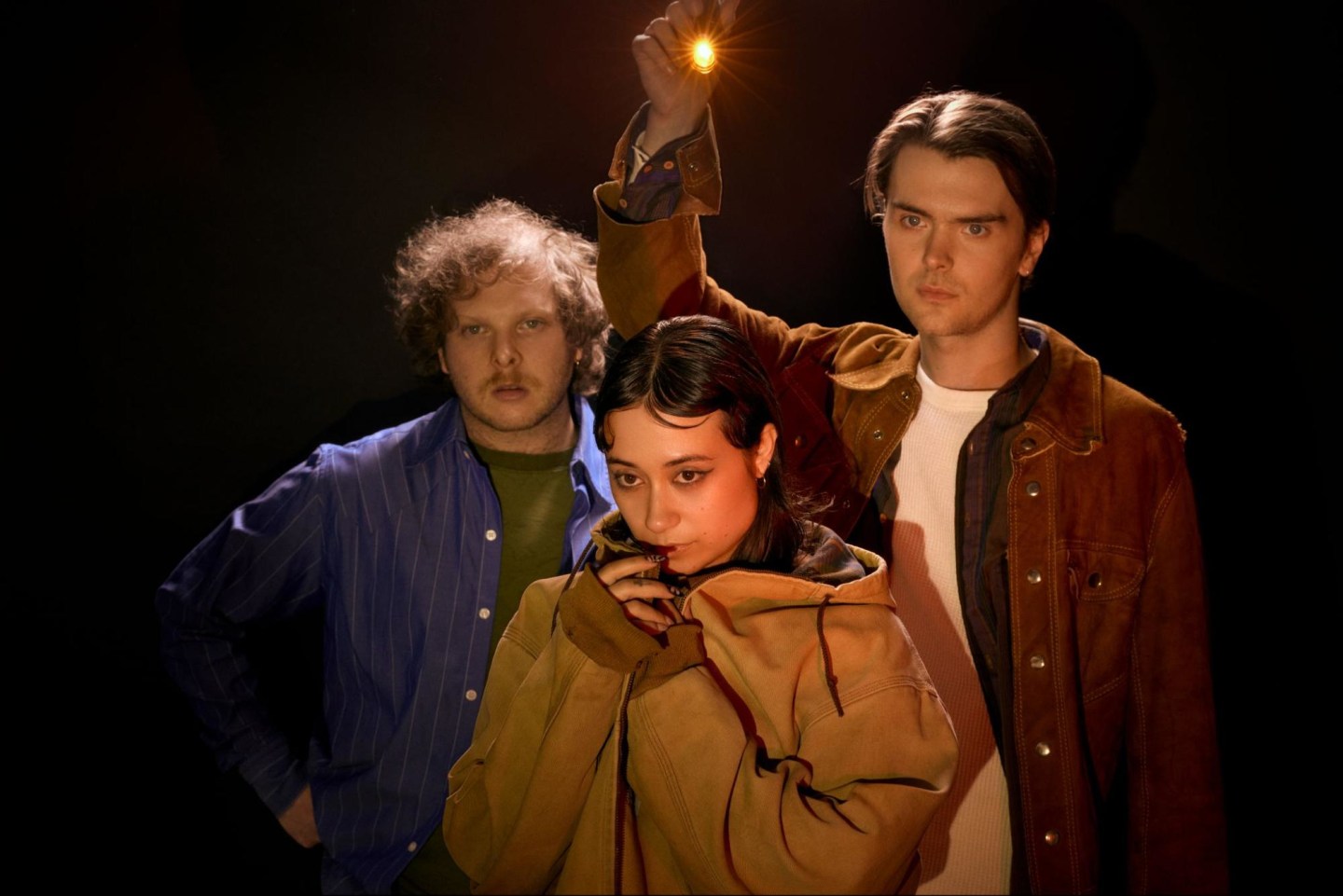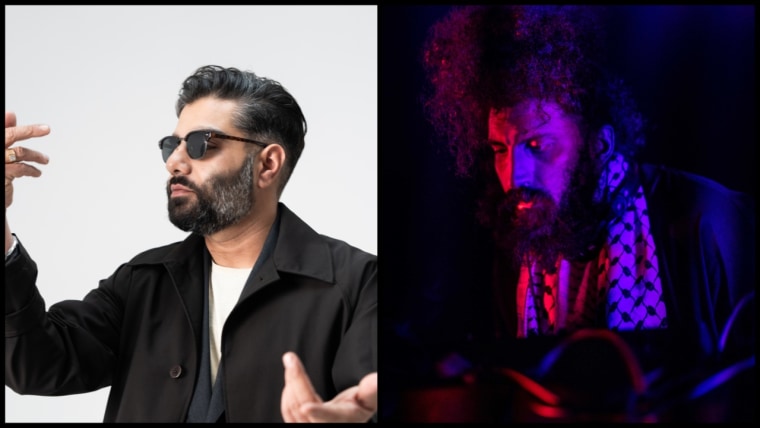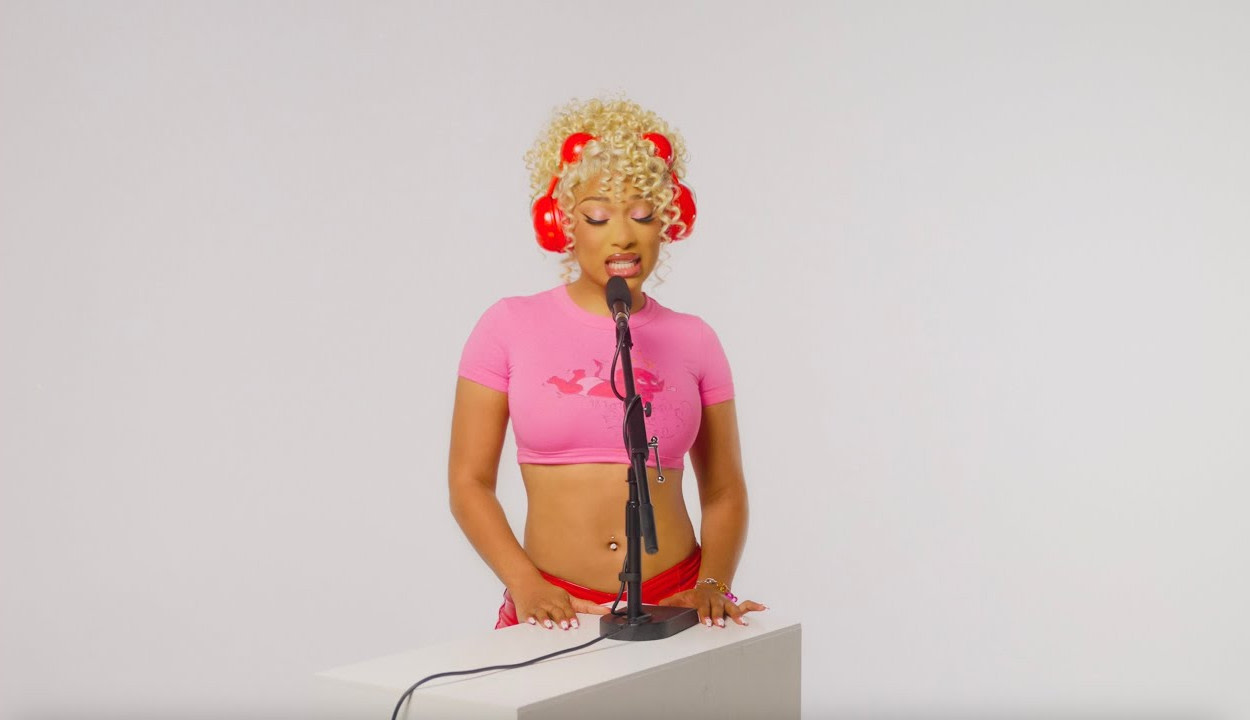David Brandon Geeting
For the past 10 years Spirit of the Beehive have stitched, sampled, howled, and thrashed their way towards becoming a captivating and unpredictable band determined to test the boundaries of guitar music. Zack Schwartz, Rivka Ravede, and Corey Wichlin came out of the same Philadelphia DIY scene that produced bands like They Are Gutting A Body of Water and Full Body 2, releasing four albums of distorted and unsettling indie pop covered in a thick patchwork of noise, deathly imagery, and creepy field recordings. Their 2021 album Entertainment, Death was a chaotic and psychedelic exploration of the paranoia that comes with creating art in the attention economy, veering off on wildly surreal lyrical tangents about the anxiety of welcoming children into a disintegrating world and how it feels to be poisoned by carbon monoxide.
Now, as they release their fifth album You’ll Have To Lose Something, the band are reorienting themselves towards a less gnarled approach. Speaking to The FADER from his home in Philadelphia, Wichlin cites Kanye West and Charli XCX as pop artists he admires for “combining strange sounds with perfect pop melodies and hooks.” It may sound like an unlikely pivot but You’ll Have To Lose Something is undeniably softer to the touch than previous Spirit of the Beehive projects. “Let The Virgin Drive” has the feel of a ‘60s soul classic, unearthed by a diligent crate digger. “I’ve Been Evil,” meanwhile, is one of a raft of songs that marries a hazy analog ambiance with some of the most polished and accessible songwriting of the band’s career thus far. Ravede backs up her bandmate, describing the album as “less antagonistic and a lot more poppy,” while reassuring the freaks that “the lyrics are still about stalking people and being trapped in basements. So it’s all in keeping with our lore.”
The slightly shinier presentation of You’ll Have To Lose Something doesn’t hide the unvarnished feelings at its center. Ravede and Schwartz were together for a decade and called it quits two years ago; the band nearly ended, but instead Spirit of the Beehive opted to write an unconventional breakup album. Ravede is now living in Portugal while Schwartz and Wichlin remain in Philly, making the album’s recording more of a logistical challenge than it ever had been. The group released an EP last year [I’m So Lucky] which acted as a test as to whether they could carry on as before, with You’ll Have To Lose Something being their first major post-break-up project. Below, the band discuss how they decided to persevere, as well as recording samples at a wedding and finding new roles as bandmates.
The FADER: Rivka, let’s start with the album artwork that, like previous Spirit albums, you painted. What made the image of a knife going through an avocado and into someones hand so right for You’ll Have To Lose Something?
Rivka Ravede: It’s just like a big dumb accident, you know It’s like you made one wrong move and then you got a knife through your hand. But all you were trying to do was make breakfast.
Is that a metaphor for something?
RR: I guess, yeah. That things can really go wrong for you very quickly. This album is a breakup album and things do feel like they just change very quickly. One day everything is one way and the next day your life is completely different. I feel like I’m constantly teetering on the edge of disaster.
I’m So Lucky was something of a test for you guys after the break-up but did it help creatively in any ways, too?
Zack Schwartz: We wanted to bridge the gap between Entertainment, Death and this new album, for sure. There were periods in the last few years where we thought we weren’t going to continue but I think this record is proof that it all still works between us.
Corey Wichlin: I think the EP was a gut reaction to the whole situation and the album is a more digested version. We’ve all had time to process what happened and to rebuild our relationships whereas with the EP, we were still working through that.
What prompted you to move away from some of the harsher sounds you have leaned into in the past?
CW: The idea is not to never be antagonistic, but to be antagonistic in intentional ways. We’re all interested in pop structure but in a way that’s not just repetitive and boring.
And what about samples? Is there anything on the album you’re particularly happy to have sampled?
ZS: I was at my girlfriend sister’s wedding and there was a string quartet. I was upstairs and I recorded it on my phone. In the studio me and Corey wrote a string section that comes in and resolves the melody but in stereo instead of mono, which I thought was kind of cool because it sounds like they’re the same piece, but they’re they’re not at all. We sampled a fair amount on this record, but I think it’s less obvious than in previous projects.
What did you learn about each other while writing this album?
RR: We definitely learned things when we were writing lyrics. We’re all interpreting each other’s words and then elaborating on them in our own verses. So it’s kind of like a game of telephone.
CW: Collectively, we’re not the most communicative bunch so the music is like a way of having a relationship with each other and working through things in that way. We’re writing about each other and what we’re going through when we can’t talk about things or don’t want to talk about them.
There’s a real sense of unease that you create with your music. Where does that desire for discomfort come from?
RR: I think that all of us are drawn to that sort of energy in one way or another.
ZS: It exists in everyday life so you can’t ignore it. Daily anxieties are part of the human experience but we also play with tension and release pretty regularly.
Rivka, you moved to Portugal while working on the album. Is your new location felt in the songs at all?
RR: Our dynamic has shifted so drastically that physically I’m somewhere else and now sort of spiritually within the group I am somewhere else, too. It has definitely shifted the way I approach working. I’m trying to take more of a front seat role where I used to be more supportive, which is where I’m comfortable. I’m just trying to find my voice in the band and I only really write about my internal life but being away from everybody is something that does affect me. So that is part of what I’m writing about in some of the lyrics.
“Found A Body” is the first full song I had given to the band completely on my own. It’s me being nostalgic and looking back at the past and mistakes that I made, just kind of like watching it like a movie in my head.
And how does the dynamic in the group feel right now? You committed to making the album so it must be pretty good…
RR: I think we’re in a good place. the dynamic has shifted, but we still work well together. They’re still my best friends. We’ve been doing this band for a really long time and it’s really important to all three of us.
ZS: It took many months to agree to continue working together but I don’t know if there was ever a time that we were unsure as to whether we wanted to keep making music together.




